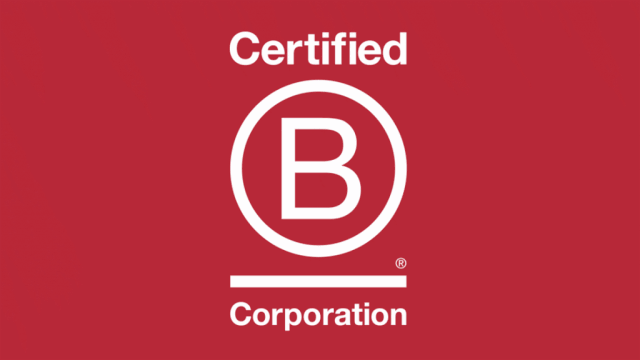
"If tens of thousands of commercial enterprises also do public welfare, the power to solve social problems can be expanded tens of times, hundreds of times, even thousands of times." --Wu Jinglian
On April 15, Professor Wu aged 88, appeared as a guest speaker at the China-Europe Social Responsibility Theme Forum sponsored by the China-Europe International Business School (CEIBS) in Beijing.
He is a leading figure in the field of economics in China, and he has another identity--a member and a promoter of China's folk public welfare. This time he broke the boundary between the two identities, he explain why today 's corporate social responsibility needs to be raised to an unprecedented height from the perspective of historical development and economics.
"Companies should not only be accountable to shareholders, but also shoulder the social responsibility of being accountable to all stakeholders," he said. "If tens of millions of enterprises can also apply the entrepreneurial spirit of innovation to do public welfare, the power to solve social problems can be expanded tens of times, hundreds of times, even thousands of times."
Professor Wu spoke to the students and alumni of CEIBS, the so-called "Huangpu Military Academy for Business", hoping that more entrepreneurs would realize their social responsibility and work together to promote the important trend of Benefit Corporation that represents the future development trend of business.
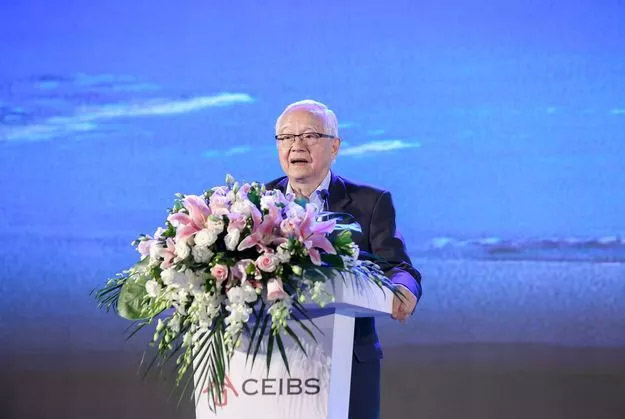
(Jinglian Wu delivered a speech at the China-EU Social Responsibility Forum)
Why is it necessary for us to raise the corporate social responsibility to such a high level today, and why will the corporate social responsibility become a new trend in the 21st century? In order to answer these questions, we should learn about the background of the development of modern society.
With the deepening of the division of labor in modern society, the scope and frequency of transactions have increased dramatically, and the problems that need to be dealt with in the public sphere have become more and more complex.
The 19th century saw a breakthrough in the "domain dichotomy" in which public affairs were handled by the government and private affairs by the family and the enterprise. The "third sector", composed by non-governmental public welfare organizations dealing with local public affairs, is often overstretched and unable to cope with more and more complicated public problems due to the limitation of donated resources.
Against this background, it is on the agenda to further break down the divide between the public and private spheres and to mobilize more resources to deal with public affairs.

In this way, in the late 20th century, there was a new trend of traditional public welfare organizations and traditional commercial enterprises facing each other. On the one hand, many public welfare organizations no longer rely solely on donations to support social services, and began to try to use commercial means to obtain operating income to strengthen the ability to provide social services. On the other hand, some commercial enterprises no longer regard economic returns as the sole purpose of their operations, but commit themselves to fulfilling more social responsibilities. As a result, a batch of so-called "social enterprises", "the fourth sector" and other both public and commercial "mixed organizations" emerged.
Remarkably, a number of commercial enterprises have set themselves clear social goals. The emergence of this new type of enterprise is significant, because if millions of enterprises can apply the entrepreneurial spirit of innovation to do public good, the power to solve social problems can be expanded tens of times, hundreds of times, even thousands of times.
In fact, as early as the late 20th century, some insightful people began to advocate for profit commercial enterprises in addition to strive to maximize corporate profits and shareholders' income, but also to assume social responsibility. Anyone who knows the history of modern companies knows that there was a "corporate governance movement" around the world in the early 1990s.
The main content of this movement is to establish the principle of "investor sovereignty" and "shareholder interest first" and the owner's (shareholder's) ultimate control right in the corporate governance structure, aiming at the problem of "insider control" of the senior managers under the condition of the separation of ownership and management right. It is in this process, however, that some economists raise further questions.
They argue that it is not only shareholders who take risks and are entitled to receive "residual income" , but also other stakeholders (stakeholders), including employees, parts suppliers, product sellers, residents of the community in which the business is located and society as a whole.
An American economist named Margaret Blair also wrote a monograph entitled "Ownership and Control: Rethinking Corporate Governance in the 21st Century" in 1994, arguing that companies should be accountable not only to shareholders but also to other stakeholders.
At that time, however, this idea was not accepted by the society. In the corporate world, most people still believe that directors' responsibility is to run their own business and make more money for their shareholders. Only in the new century, under the impact of actual social contradictions and social trends of thought, more and more people accept the idea that enterprises should take greater social responsibility.
Many enterprises change their vision from maximizing shareholder value to maximizing the value of all stakeholders, and gradually form a new corporate culture trend by elevating social responsibility to the important position of corporate goals. Some countries also require public companies to publish reports to society on corporate social responsibility.
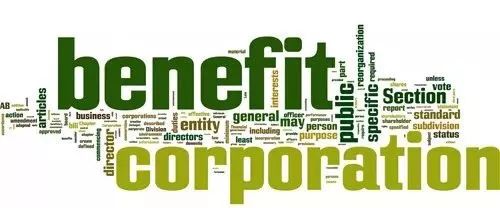
Subsequently, a number of countries have established legal frameworks for this new type of profit-making enterprise. In the United States, for example, 35 states have enacted new law of B Corps, since 2010, when Maryland enacted new law about starting a new type of company, the Beneficial Corporation.
Companies of this type are not entitled to tax preference, but are required to specify in their articles of association their social responsibilities, and the board of directors is in charge of these responsibilities and reports to society. In some states, corporate law also provides that successive directors may not alter the social responsibilities set out in the original articles of incorporation.
The effective operation of the B Corps system also needs to solve a problem, that is, how to help and supervise these B Corps to fulfill their social responsibility. Relevant legal provisions are often more abstract, in addition to the self-discipline of enterprises, but also from the social help and supervision.
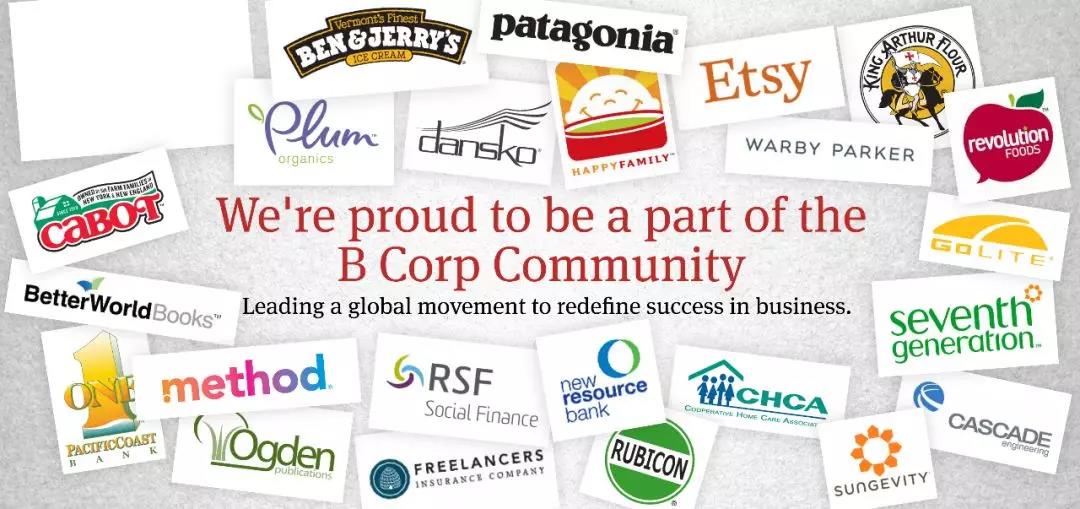
There
are now various certification organizations in the United States. Among them is
a certification organization called B Lab, which issues a certificate called
"B Corp Certification" to certified B Corps . Currently, more than
2,482 companies in more than 130 industries have been certified by B Lab in
more than 50 countries. Familiar companies such as Danone, Kickstarter and
others are all B Corps.
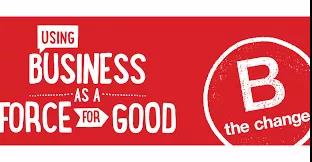
In 2017, the Beijing Leping Social Entrepreneur Foundation established the B Corps China Task Force with B Lab to actively promote the development of B Corps in China. So far, nine mainland Chinese companies have been certified by B Lab.
Most of certified B Corps in China are small and medium-sized enterprises. The founders of these enterprises are mostly "post-80s generation" and "post-90s generation". They often agree with the idea that enterprises should fulfill their social responsibility at the beginning of their business, and practice their responsibility to stakeholders in the process of business operation, so they may become a new force to strengthen the ranks of social entrepreneurs.
Professor Wu hopes that in the near future, China's "Company Law" will include the corporate form of B Corps. At the same time, professional certification organizations such as B Lab can help more Chinese enterprises to improve their quality and realize the dual value of business and society.
At the end of his speech, Jinglian Wu said that a system such as B Corps is evolving in China from an imaginary and theoretical discussion to a reality. If more and more Chinese entrepreneurs are willing to redefine success, more and more institutions and individuals are willing to participate in promoting the complete development of enterprises in the policy, evaluation and certification, concept advocacy and other dimensions, this trend will play a far-reaching positive impact on the development of China's economy and society.
The Beijing Leping Social Entrepreneur Foundation was officially registered in October 2010 and is co-sponsored by credible Chinese economists, academics and businessmen. At present, our standing directors include: Luming Ai, Rongqiang Lin, Yushi Mao, Dongshu Shen, Min Tang, Jinglian Wu, Qingzhi Zhou, Weiying Zhang, Zhongyun Zi.
Leping is committed to building an inclusive society that provides an ecological environment for people who are genuinely concerned about social development to solve social problems.



